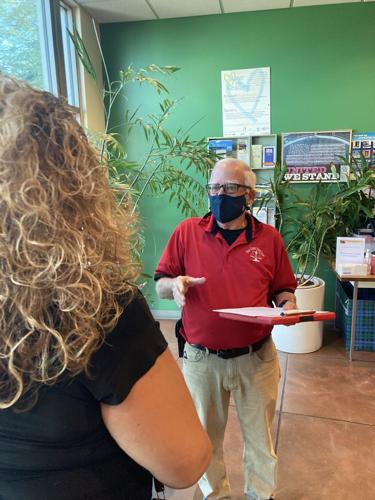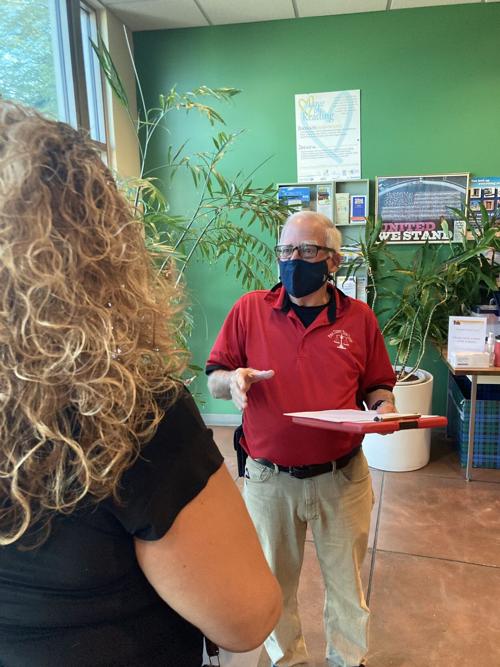Alan Hutton was working at the front desk of Southern Arizona YWCA’s Pima County Teen Court one Saturday this fall. Behind him, squirming on a chair, sat a middle-school student. Guilty of abetting a crime, the young teen was there to be sentenced.
“Nervous,” Hutton observed, sympathetically, having just registered the child. “This is serious.”
Hutton would know. The 75-year-old had spent 32 years working as a probation officer and he’s volunteered at Teen Court for 12 years. He can read body language.
A diversion program that offers young offenders an opportunity to accept responsibility for their offenses and avoid adjudication (the juvenile version of conviction), Pima County Teen Court is remarkable in that other kids prosecute and defend the cases and do the sentencing.
Established in 1995, it grew out of a community desire for alternatives to the juvenile justice system.
On a phone call recently, Claire Scheuren, a founder and early director, talked about its beginnings. It would not have succeeded, she said, without buy-in from the law and law enforcement. She lauded individuals: attorney (later, Judge) John Davis, who helped research programs; Arizona Supreme Court Justice Stanley Feldman, who found funds; Juvenile Probation Officer Supervisor Pat Dicurti, who “was a star from the start”; and Pima County Attorney Barbara LaWall, who took a risk to OK the program.
“Think of it,” Scheuren said. “In 1994, the idea that children could make decisions that affects them was unheard of.”
Now there are now teen courts all across the US.
The objectives are clear: To achieve youth empowerment and restorative justice by providing an alternative to the juvenile court process, reconnecting with the community, and providing constructive consequences for offenses.
Hutton explained jury court day procedures:
Recommended by Juvenile Court, a 12- to 17-year-old who has admitted guilt to a criminal offense reports to Teen Court accompanied by a parent or guardian. A wellness check is made for mental health and substance abuse needs, and the parent is interviewed. They then meet with the teen defense attorney (who has actually passed the Teen Bar Exam).
Meanwhile, teen jurors are given their instructions. Composed of both volunteers and offenders doing their sentences, the jurors have their roles explained and learn what sentences they can impose. In addition to the mandatory sentence (a child/parent workshop on decision-making, one jury duty, and a letter of apology), the jury can impose infraction-specific sentences.
Court proceedings continue like regular adult court, with a teen bailiff and clerk. The magistrate — an adult — presides only to facilitate the process. After the sentencing, an exit interview is held.
After that, Hutton explained, there’s one more meeting down the road — the wrap-up that documents the completion of the sentence. “Once,” he says, laughing, “a couple of boys hugged me. Big, manly boys hugged me!”
That reaction’s not surprising. As Teen Court manager Kate Spaulding wrote when she awarded Hutton a Ben’s Bell in 2020, “Alan’s welcoming, joyful attitude infects those around him.”
Hutton’s not the biggest guy around, but he has a huge smile and charismatic presence. As a kid in Burbank, California, he was drawn to organizations, not sports. “My brother was the athlete,” he says; “I was in Teenage Republicans, Eagle Scouts, Junior Achievement.” With a degree in psychology from San Diego State, he joined the San Diego County Probation Department. After five years there, he took a rougher job with the San Bernardino Probation Department but stayed on till retirement.
Hutton reckons he handled 2000 adult cases and 500 juvenile ones. San Bernardino is a relatively small jurisdiction, so Hutton got to know “all the attorneys, the judges,” and became “the face of probation.” And you’ve got to play straight in a situation like that; in order to present a convincing pre-sentencing report, you need to keep your reputation spotless.
Hutton chuckles about one court incident, involving one Judge Leroy Simmons: “I am inclined to follow the recommendations of Alan Hutton,” Simmons pronounced, wryly, “because it’s well known that the milk of human kindness does not run in his veins.”
When Hutton retired to Southern Arizona in 2002, he took his experience to community service. For five years, he served as a court-appointed special advocate for children. He served on the Foster Care Review Board, participated in Green Valley Kiwanis (twice Kiwanian of the year) and Air Force Reserves, and he currently volunteers with the Green Valley Sheriff’s Auxiliary Volunteers.
But it’s Teen Court that has his heart.
He’s covered all the roles adult volunteers take in Teen Court — front desk, expediter, magistrate, jury monitor, wellness screener, exit interviewer, and wrap-up facilitator. He doesn’t miss a Saturday. And he’s proud of the program.
As he says, “Teen Court is for everyone — not just the offenders. Teenagers can learn about the American legal system by volunteering for juries and by serving as prosecutors and defense attorneys. Many of these former TC lawyers are now practicing law themselves.
Hutton had more tasks to attend to that fall morning, so I followed the middle-schooler into court. The defendant took the stand and was sworn in. Under clear, articulate and direct — but sensitive — questioning by both the defense and the prosecution, the child tearfully admitted guilt and regret for assisting one child to commit a crime against another.
Observers filed out, the jury deliberated, and it returned its unanimous sentence: the minimum mandatory decision-making workshop, jury duty, and letters of apology.
Before dismissal, though, the foreman paused a moment. Addressing the middle-school defendant, the high schooler said, quietly, “The jury would also like to offer you this advice: Know who your friends are. Pick your friends carefully.”
Head down, but calm now, the young teen nodded.
When Hutton heard that, he just smiled. “Only a kid can tell another kid that, and have it be heard,” he said. That’s why you love Teen Court.







